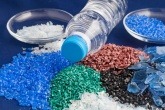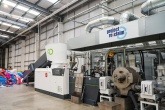‘World’s first’ PET biorecycling plant under construction in France
French biotech company CARBIOS has broken ground on a site in Longlaville in the Grand-Est region of France. It will be home to what the company claims is the world’s first PET biorecycling plant.
The new plant will process PET waste from plastic packaging and polyester textiles using enzymatic depolymerisation, a form of chemical recycling which has advanced rapidly in recent years.

During enzymatic depolymerisation, waste PET is placed in a bioreactor with enzymes that break down PET polymer chains into their component parts (monomers). These monomers can then be purified and repolymerised into new high-quality plastic.
Typically, PET recycling involves thermomechanical processes, which are only effective on clear, clean plastic. Complex, multilayered, opaque, coloured and soiled plastics are difficult to recycle. Further, the quality of the material reduces every time it is recycled.
Enzymatic depolymerisation, however, has the potential to process all types of PET waste and maintain material quality.
In promoting their solution, CARBIOS claim the quality of their recycled PET is comparable to that of the virgin material made from oil. Therefore, enzymatic depolymerisation could reduce the world’s reliance on fossil fuels and support the circular economy.
CARBIOS highlighted that advancing enzymatic depolymerisation is valuable for manufacturers looking to reduce the environmental impact of their packaging and “positions France as a pioneer in green innovation”.
The company also stated that their new biorecycling plant will create 150 direct or indirect jobs in the Grand-Est region.
President of France, Emmanuel Macron, commented via LinkedIn: “A technological revolution is taking shape tomorrow with the groundbreaking ceremony of CARBIOS’ plant in Longlaville: the world's first biorecycling plant. French pride! Ecological transition and growth, made in France, and innovation go hand in hand.”
Christophe Béchu, Minister for Ecological Transition and Territorial Cohesion, added: “At a time when governments are negotiating an international treaty against plastic pollution in Ottawa, the groundbreaking of CARBIOS’ biorecycling plant is particularly significant.”
“It illustrates France's commitment to the ecological transition, and demonstrates our ability to turn challenges into opportunities for a more sustainable future.”
“This plant, a world first, embodies French innovation in responding to complex environmental challenges, offering a sustainable solution for a future where plastic and textile waste will be transformed into valuable resources for a truly circular economy.”
How will the plant operate?
CARBIOS’ biorecycling plant will process up to 50 kt (50,000 tons) of prepared PET waste per year when operating at full capacity.
Several feedstock supply agreements, notably with CITEO and Landbell Group (owner of UK compliance scheme ERP), will secure the vast majority of the raw materials required.
Close to the borders with Belgium, Germany and Luxembourg, the plant's location is strategic for access to nearby waste supplies.
CARBIOS is part of France 2030 - a major national investment scheme that aims to help companies, universities and research institutions respond competitively to sustainability challenges.
As part of this scheme, CARBIOS will receive grants totaling €54 million from the French State and Grand-Est Region to support their work.
CARBIOS has also collaborated on the project with several brands, including L'Oréal, L'Occitane en Provence, PUMA, Suntory Beverage and Food Europe, Salomon, On, CITEO and Novonesis.
At the recent groundbreaking ceremony, Philippe Pouletty, Founder and Chairman of CARBIOS’ Board of Directors, commented: “We can help save the planet thanks to science, passionate teams, private and public funding to meet industrial and commercial stakes, and loyal partners.”
Further highlighting the importance of professional partnerships, Antoine Vanlaeys, Chief Operating Officer at L'Oréal Group, added: “We are delighted to be a long-standing partner of CARBIOS: an adventure that began nearly seven years ago… We believe in the power of collaboration to build solutions for the future with our partners and get closer every day to reaching our sustainable development objectives. The partnership between L'Oréal Groupe and CARBIOS is testament to this.”
Progress of the project
CARBIOS launched its industrial demonstration plant in September 2021 to test the technical, environmental and economic performance of the enzymatic depolymerisation process.
The company obtained the building and operating permits for the new facility, which will be their first commercial biorecycling plant, in October 2023.
In February 2024, CARBIOS officially acquired the land from Indorama Ventures and announced its collaboration with De Smet Engineers & Contractors (DSEC). The site is now under construction.










